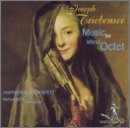| All Artists: Triebensee, Biehl, Amphio Wind Octet Title: Music for Wind Octet Members Wishing: 0 Total Copies: 0 Label: Pan Classics Release Date: 10/30/2001 Genres: Special Interest, Classical Styles: Marches, Chamber Music, Forms & Genres, Concertos, Historical Periods, Classical (c.1770-1830) Number of Discs: 1 SwapaCD Credits: 1 UPCs: 675754440329, 7619990101258 |
Search - Triebensee, Biehl, Amphio Wind Octet :: Music for Wind Octet
 | Triebensee, Biehl, Amphio Wind Octet Music for Wind Octet Genres: Special Interest, Classical
|
Larger Image |
CD Details |
CD ReviewsVery pleasing account of period wind music from Triebensee Larry VanDeSande | Mason, Michigan United States | 09/13/2006 (4 out of 5 stars) "Josef Triebensee (1772-1846) was, with Krommer, Myslivicek and a few others, one of the linchpin composers of haromoniemusik from the late 17th and early 18th centuries. This music was often composed, played and performed as both entertainment for royalty and as a way for local groups to perform larger works.
Triebensee's most popular composition was his 20-movement wind arrangement of Mozart's "Don Giovanni". It was typically written for six to eight woodwind players. The music is often expanded to include a double bass in modern recordings. This recording includes Triebensee's Partita in E flat major, which has been recorded before, a funeral march, the delightful Concertino for fortepiano and pairs of oboes, clarinets, horns and bassoons, and a less popular Partita in B Major for eight winds. This music is all entertaining and well done by the Amphion Wind Octet, a period instrument ensemble. This group also recorded a selection of Partita-Octets by Krommer on another Pan Classics CD. That recording featured an instrument I had never before seen nor heard of -- the "Serpent", which I assume is a period contrabassoon. There's no serpent used here. I've heard a recording of the Partita in E Flat Major from about 1980 by Collegium Musicum of Prague on a Supraphon Gemini cassette. The earlier recording was more in tune with the friendliness of this composition than this one. While the performers relish the music, they also push it a bit more than its nature will accept, by my reckoning. I think the older recording is more in tune with the old world fascination of this down to earth score. Elsewhere, the Concertino must be considered the major composition on this recording. While there is a lot of thematic repitition in its first three movements, the score comes alive in the concluding Menuetto and Rondo movements. In particular, hammerklavier player Michael Biehl distinguishes himself with clever and imaginative voicing. The interplay between soloists and Biehl in the Rondo are delightful and thoroughly engaging, and Biehl finishes off the performance with a lengthy cadenza at the coda. While not the final word in Triebensee performance, this CD (if you can find it) presents a keepsake of the delights this music presented, and sounded like, for aristocratic audiences around 1800. The outstanding recording was made in Zurich in August 2000 and gives you a wonderful idea of what this would sound like today in your living room." |

 Track Listings (14) - Disc #1
Track Listings (14) - Disc #1